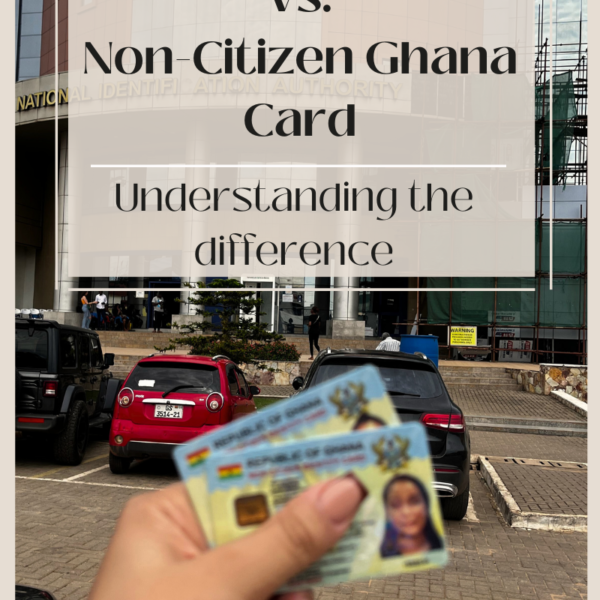In addition to the Ghana Card, which serves as the national identification system for Ghanaians and legal residents, there is a separate identification document known as the Non-Citizen Ghana Card.
It is important for individuals from the diaspora moving to Ghana to understand the distinction between these two cards.
Let’s explore the key differences:

1. Purpose
Ghana Card
The Ghana Card functions as a comprehensive identification document, encompassing various aspects of an individual’s identity, including:
– personal information
– biometric data
– a unique identification number.
It serves as a means to access a wide range of services and participate in democratic processes, such as voting.
(It can be compared to the Personalausweis in Germany.)
Non-Citizen Ghana Card
In contrast, the Non-Citizen Ghana Card focuses on identifying non-Ghanaians residing in the country.
While it may also facilitate access to services and serve as proof of identity, its primary purpose is to establish the legal status of non-citizens and provide them with an official identification document recognized by the Ghanaian government.
2. Eligibility
Ghana Card
The Ghana Card is primarily designed for Ghanaian citizens and legal residents of Ghana.
It serves as proof of citizenship or residence and is issued to individuals who meet the criteria set by the National Identification Authority (NIA).
Ghanaians can obtain the Ghana Card by providing the required documentation and undergoing the necessary registration process.
Non-Citizen Ghana Card
On the other hand, the Non-Citizen Ghana Card is specifically intended for non-Ghanaians who reside in Ghana legally.
This card is issued to foreigners who hold resident permits, work permits, or other valid immigration documentation.
It enables non-citizens to establish their identity and access various services in the country.
3. Documentation
Ghana Card
To obtain a Ghana Card, Ghanaians typically need to provide proof of citizenship, such as a birth certificate or a valid Ghanaian passport, along with other supporting documents.
Legal residents of Ghana are required to present their residence permits or other relevant documents issued by the appropriate authorities.
Non-Citizen Ghana Card
Non-citizens seeking the Non-Citizen Ghana Card must provide valid immigration documentation, such as a resident permit or work permit, to prove their legal presence in Ghana.
The specific requirements and documentation for the Non-Citizen Ghana Card may vary depending on the individual’s immigration status and the policies set by the NIA.
Conclusion
Understanding the distinction between the Ghana Card and the Non-Citizen Ghana Card is crucial for individuals from the diaspora moving to Ghana.
While the Ghana Card caters to Ghanaians and legal residents, providing them with comprehensive identification and access to services, the Non-Citizen Ghana Card serves as an official identification document for non-Ghanaians residing in the country.
By familiarizing themselves with these cards and their respective requirements, individuals can ensure they obtain the appropriate identification document that aligns with their citizenship or residency status, enabling them to fully benefit from the opportunities that Ghana offers.
In the next article, we will delve into the benefits the Ghana Card unlocks for you.





Leave a Reply
You must be logged in to post a comment.